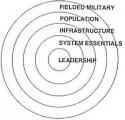Personally I am a consistent (and fairly lonely) voice that the U.S. needs to take into greater account the impact on Pak-Indian deterrence of the actions (both policy and physical) that we take in the name of the War on Terrorism.
"Loose Nukes" are not all that likely based upon what I understand, but certainly the likelihood of deliberately exchanged nukes is higher now than it was 10 years ago.
I would never say that Pakistan has a right to an unstable Afghanistan ( be that worked through their Army or intel service with Pashtun agents, or however else). I only state that Pakistan believes that they have a vital national interest in it being so.
If the U.S. is any example, a nation will go to any lengths, and get into situations that make outside observers scratch their heads in wonder, in the pursuit on vital national interests. And I doubt any will argue that Pakistan faces far more of an "existential threat" against India than the U.S. does from AQ taking sanctuary in the FATA.
My only point was the observation that our demands on Pakistan to support our efforts against AQ and the Taliban creates a very dangerous conflict of interest for the government, that erodes the stability of the nation. On one hand they need a solid relationship with the US, so they agree to do what we ask (sort of, and thus our frustration at the seeming lack of competence from what is a very competent security force); while at the same time seeking to continue their covert operation to secure instability in Afghanistan.
Now the US finds ourselves in a similar conflict of interest of our own making. On one hand we stand for "universal rights" and democracy; but on the other hand we support the Mubarak government as a critical Arab ally that sits on the key terrain of both Israel's flank and the Suez canal. Such relationships are rationalized based upon vital national interests, yet when they create conflicts of interest they are damaging as well.
We have an opportunity to begin cleaning the effects of a post WWII policy/strategy/engagement program in the Middle East that has about reached the breaking point. We do not want to wake up on the wrong side of history there, and if we continue to cling to an unsustainable past that is the most likely result. We have a tremendous opportunity here, but it is a delicate game of showing greater support to the people, greater alignment of our actions and policies with our stated principles as a nation; but condemning of the actions of "allied" governments who have been enabled in their slides toward despotism by their relationships with the US. If we just yank the rug on these clowns we could create a massive violent chaos in the Middle East that is good for no one.
We must empower a controlled change. We focus on the empower aspect, and allowing the current governments to establish processes with their people to hear their grievances and give them their due consideration as they seek reasonable evolutions of government. This is tricky stuff. Far easier to just send in TLAMs, but the potential return is far greater and holds the key to reducing acts of terrorism emanating from the Middle East.
So far what I have heard from our President and our Sec State; coupled with what I have seen in terms of physical responses are in synch with how I see this. I don't know what the back room actions are, but I can only hope they are in synch as well. In synch or not, agree or not, I think we can all share in the hope that they work. Inshah Allah.
















Bookmarks